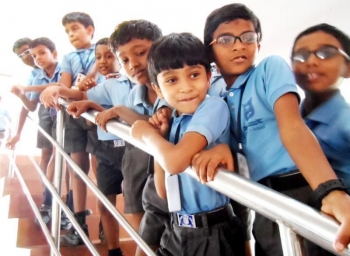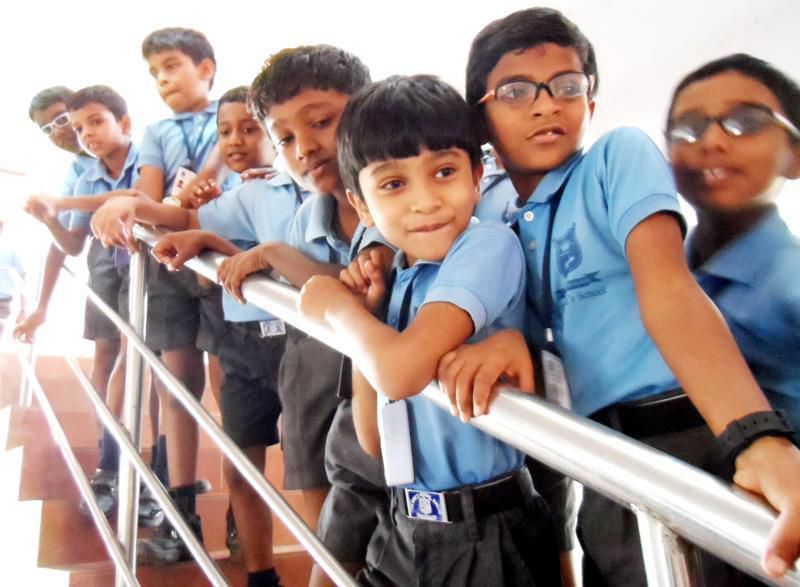
.png) Jacob Peenikaparambil
Jacob Peenikaparambil

The most significant ministry of the Catholic Church in India in terms of visibility, infrastructure and human and financial resources is education. According to the website of the CBCI Office for Education, “Catholic Church is the largest education provider in the world. In India too after the government of India, we are”. The total number of educational institutions is 54,937 according to the website. If we calculate the average 1000 students in each institution, the total number of students studying in Catholic educational institutions in India could be 5 to 6 crores. Naturally these institutions have access to at least 10 crore parents and five to six crore families. The alumni of these institutions could be also in crores, spread out in various sectors like professionals, politicians, higher echelons of bureaucracy and administration, corporate owners and CEOs etc. The reach of the Catholic educational institutions is truly amazing.
Against the backdrop of increasing attacks on Christian churches and institutions, including educational institutions, a crucial question that arises is “What is the impact of more than fifty thousand Catholic educational institutions on Indian society? When a school is attacked by the right wing groups on the basis blatantly fake news of conversion, and property is vandalized, why not the local people, including the parents and the alumni, come forward to support the school? Why do the local media publish only the version of the right wing groups and not of the school management?
Time has come for the dioceses and religious congregations who run the educational institutions to do a deep introspection and an objective evaluation of the influence of their educational institutions on Indian society and ask some relevant questions. What changes are needed in the policies and approaches of the Catholic educational institutions? Are those who manage these institutions aware of the radically changed socio-political atmosphere since the BJP came to power at the centre in 2014 under the leadership of Narendra Modi? Has the management taken precautions or preventive measures in view of the BJP governments’ policies to convert India into a Hindu Rashtra where Muslims and Christians would be treated as second class citizens?
All dioceses and religious congregations that run educational institutions hold the view that education is a mission. In fact, education is the most effective means to make all types of students the disciples of Jesus without changing their religion. Anyone one who follows the values, principles and teachings of Jesus is a disciple of Jesus. Mahatma Gandhi was a true disciple of Jesus. That is why Bertrand Russell said about Gandhiji, “I know only one Christian, but he is not a Christian”. As an integral part of value education, the values of Jesus could be easily imparted to the students. More than teaching the values, the students of Catholic educational institutions should be able to see the core values of Jesus: forgiveness, sensitivity, compassion, respecting the dignity of individuals etc, is being practiced by the priests and the Religious who run the educational institutions. If they fail to practice the values of Jesus, and at the same time if they try to impose rituals and prayers on the non-Christian students, there could be backlash in the current socio-political context of India.
The crucial question is how far the Catholic educational institutions have succeeded in imparting to their students the core values of Jesus. Large majority of the beneficiaries of the Catholic educational institutions belong to the middle class. Generally the poor children who are in the hostels run by the dioceses and the religious congregations attend vernacular medium private or government schools and not the English medium schools. Of course, there are a few exceptions.
In order to reinvent the education ministry, the dioceses and the religious congregations have to take into account seriously the lessons emerging from the analysis of the present socio-political context of India. Some useful lessons and insights also can be drawn from the recently published UNESCO report, “Reimagining Our Futures Together: a New Social Contract for Education”. The report has identified four serious problems or challenges the world is facing. They are 1) climate change and loss of biodiversity 2) democratic backsliding, 3) growing social and economic inequality, and 4) disruptive technological automation. Education must enable people to face these challenges creatively if humanity is to have a bright future.
The report says, “Education has long played a foundational role in the transformation of human societies. It connects us with the world and to each other, exposes us to new possibilities, and strengthens our capacities for dialogue and action”. Therefore in order to shape peaceful, just, and sustainable futures, education itself must be transformed.
The report has given some valuable suggestions for reinventing education. First of all, Pedagogy should be organized around the principles of cooperation, collaboration, and solidarity and not on competition. Secondly, Curricula should emphasize ecological, intercultural and interdisciplinary learning that supports students to access and produce knowledge while also developing their capacity to critique and apply it. Thirdly, teaching should be further professionalized as a collaborative endeavour where teachers are recognized for their work as knowledge producers and key figures in educational and social transformation. Fourthly, schools should be protected as educational sites because of the inclusion, equity and individual and collective well-being they support.
What can be done to reimagine the education ministry in India? The Catholic Church in India has a system or structure for cooperative and collaborative actions by all dioceses and Religious congregations. For example, Education Commissions are set up at the diocesan, regional and national levels. The problem is that they are not effective in bringing together the various players to a common platform, preparing relevant action plans and implementing them effectively. On the other hand, the Sangh Parivar groups have been successful in planning and implementing their strategies effectively.
What is urgently required is convening at the regional level a joint meeting of the bishops, major superiors and representatives of responsible persons of education institutions like principals and managers for assessing realistically the education ministry, preparing an action plan for preventing and managing crises, and putting in place a mechanism to implement the action plan. Prior to that diocesan level meeting of persons in charge of educational institutions is to be organized to assess the situation and propose suggestions to be considered at the regional level meeting. These meetings are to be facilitated by experts, especially lay people, in socio-political analysis and crisis prevention and management. The following could be some proposals which could be considered while preparing an action plan for crisis prevention and management.
First of all, the Catholic educational institutions should be places where the Indian Constitutional values are appreciated and promoted. The core values of the Kingdom of God or reign of God are very well reflected in the Indian Constitution, especially in its preamble. The Catholic educational institutions should take special care to inculcate in the students the core constitutional values like pluralism, justice, equality, liberty, fraternity and individual dignity. The best way to inculcate these values is to practice them in the school itself.
For example, the teachers and students should be able to experience a culture of pluralism in the Catholic educational institutions. In order to create a culture of pluralism the following steps could be taken.
• Inter-faith prayer with common songs/bhajans and short readings from different religious scriptures on universal values of honesty, truth, love, forgiveness, justice, compassion etc. may be conducted by the Catholic educational institutions.
• In order to promote unity in diversity the symbols of different faiths and relevant quotes from different religious scriptures could be exhibited at different locations of the educational institutions.
• Festivals of all religions could be celebrated with a brief message of the festival concerned.
• There could be a common prayer room where students of all faiths can spend time for prayer, reflection and meditation. The prayer room also can have the symbols of all religions. Scriptures of different religions also could be kept in the common prayer room.
• The whole atmosphere of the Catholic Educational institutions should be one of respecting all faiths and promoting harmony among the followers of different religions.
Secondly, the Catholic educational institutions should be sensitive to the culture of all communities. Certain practices like wearing bindi on the forehead or tying rakhi on the wrist by Hindus is both a cultural and religious practice. The school management has to be sensitive to the students who follow these individual practices which in no way affect the discipline of the school.
Thirdly, those who are responsible for running the educational institutions should build excellent public relations with the local political leaders, officers, influential religious leaders, media persons etc. For this purpose, they should be fluent in the local language. One of the serious handicaps noticed in the principals and managers of many Catholic educational institutions is their inability to communicate freely and fluently with the parents and the local people in their own language.
Fourthly, the whole atmosphere of the educational institutions should be such that the students will imbibe the values of honesty, sensitivity, compassion, cooperation, collaboration, and solidarity etc. This requires more priests and Religious men and women teaching in the educational institutions, especially schools, and interacting with students, teachers and parents. Visiting the families of the students by priests and Religious who teach in the schools is an effective means to build relationships with parents. Instead of starting new educational institutions, the focus of the dioceses and religious congregations should be increasing the effectiveness of the existing institutions.
Fifthly, against the backdrop of backsliding in democratic governance and rise in Hindutva identity-driven sentiments in India, democratic and human rights education should be emphasized in the Catholic educational institutions.
Sixthly, students should develop the habit of sustainable use of the resources of the planet earth and protection of the environment. An atmosphere is to be created in the educational institutions that the students should learn not to waste anything, especially food, water and electricity, dispose waste safely, and love flora and fauna.
Lastly, a participatory administrative system with the provisions for getting feedback and suggestions from teachers, non-teaching staff and the representatives of the students and parents is to be evolved, taking into account the local situation.
In every crisis, there is a hidden opportunity. The opposition and harassment from the right wing groups should be utilized by the dioceses and Religious congregations as an opportunity to reinvent the education ministry of the Indian Catholic Church.